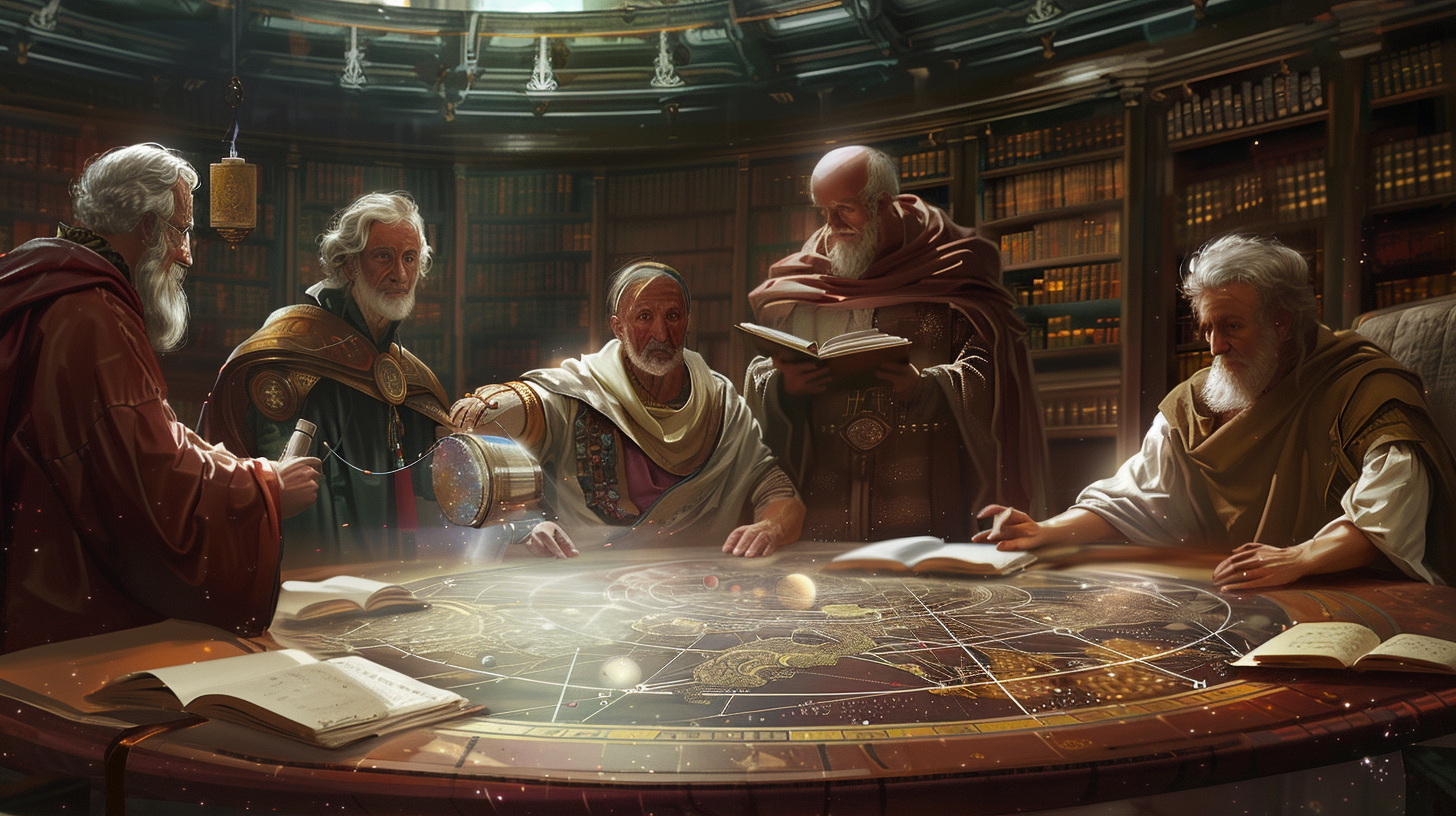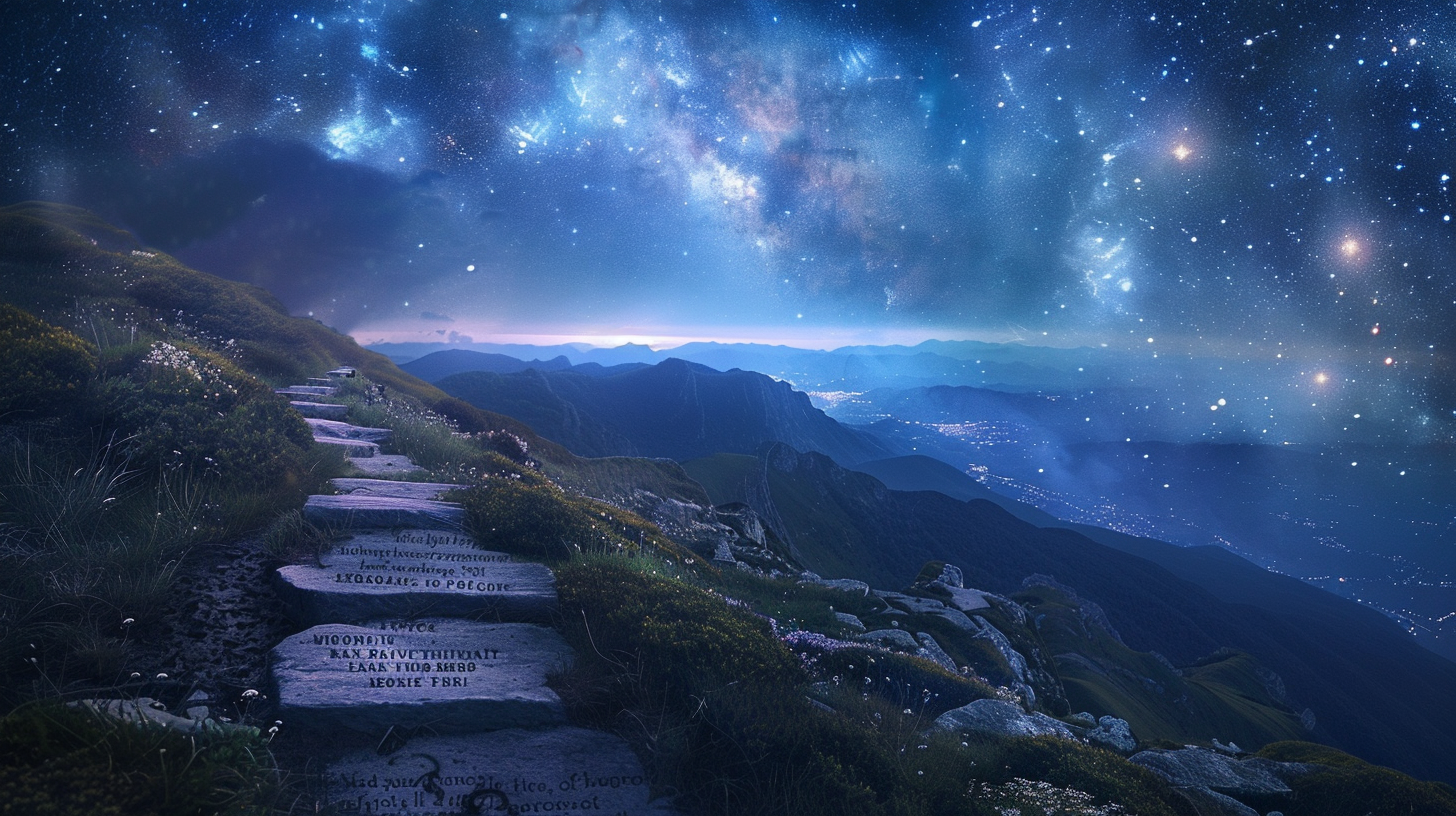Introduction

Envision standing at the edge of the known universe, gazing into the vast expanse of the cosmos—what fundamental truths about existence might you uncover? Each star a glimmer of distant worlds, each galaxy a swirl of infinite possibilities. This profound experience, though imagined, captures the essence of cosmic philosophy—a field of thought that stretches beyond the physical limits of space and time to question the very nature of reality itself.
Cosmic philosophy is not just an academic discipline; it is a journey into the heart of what it means to be. Historically, it has woven together the insights of great thinkers like Plato, who contemplated the eternal forms, and modern scientists like Carl Sagan, who pondered the significance of the human condition in the vast cosmic arena. This philosophical inquiry bridges the abstract and the observable, connecting the metaphysical with the empirical. It seeks to unravel the intricate tapestry of laws and principles that govern the universe and our place within it.
In today’s world, where science and spirituality often seem at odds, cosmic philosophy offers a unique vantage point. It serves as a bridge, proposing that our spiritual quests and scientific endeavors are not contradictory but complementary. By exploring cosmic philosophy, we delve into discussions that challenge our understanding of consciousness, existence, and the universe—discussions increasingly relevant in an era dominated by technological advances and existential risks.
The purpose of this article is to guide you through a curated list of essential readings that delve deep into the mysteries of cosmic philosophy. These books are more than just texts; they are portals to self-transformation and profound understanding. Through them, you will discover not just theories and concepts, but pathways to expanding your own perspective on what it means to truly exist.
As we embark on this journey together, let each page challenge your convictions and invite new questions, fostering a transformation that is both intellectual and spiritual. Get ready to explore the universe within through the lens of cosmic philosophy, and prepare to be transformed by the
What is Cosmic Philosophy?

Cosmic philosophy is a profound philosophical framework that endeavors to unravel the grand questions about the universe and our specific role within its vastness. This philosophical inquiry is not new; it traces back to the earliest civilizations, where thinkers gazed at the stars and pondered their place in the cosmos. Throughout history, from the dialogues of Plato to the essays of Emerson, and into the contemporary discussions influenced by scientific advancements, cosmic philosophy has sought to bridge the observable universe with the metaphysical speculations.
Central Concepts and Theories : At its core, cosmic philosophy grapples with several pivotal concepts:
The Nature of the Universe: What is the universe fundamentally? Is it merely a physical expanse, or is there more beyond what our senses perceive?
The Concept of Existence: Why does the universe exist, and why do we, as part of it, exist? What does it mean to ‘be’?
Significance of Space and Time: These are not just physical dimensions but also philosophical constructs that challenge our understanding of everything from causality to the limits of human understanding.
Human Consciousness: How does our awareness and cognitive ability affect our interpretation of the universe? Does our consciousness have a cosmic significance?
These topics are complex, yet pivotal in cosmic philosophy. They invite us to look beyond simple existence and consider deeper, more profound aspects of life and the universe.
Influence on Modern Thought: Cosmic philosophy has profoundly impacted modern thought across multiple domains:
Science: In fields like quantum mechanics and cosmology, philosophical inquiries into the cosmos influence theoretical frameworks that explain the universe at both the unimaginably large and infinitesimally small scales.
Spirituality: Cosmic philosophy offers a unique perspective that enriches spiritual practices by providing a broader context for existential questions and human purpose.
Ethics: It challenges us to consider our responsibilities not just to one another but to the entire cosmos, influencing contemporary ethical debates about technology, environment, and space exploration.
Relevance Today: In today’s fast-paced, technologically driven world, cosmic philosophy remains more relevant than ever. It helps us navigate the complexities of modern life and the existential dilemmas we face. By connecting ancient wisdom with modern challenges, cosmic philosophy encourages us to reflect on our place in the universe and consider our actions and their repercussions on a cosmic scale.
Pioneers of Cosmic Philosophy

The journey into cosmic philosophy begins with the ancient luminaries who first articulated ideas that transcended the mere physical interpretations of the cosmos. Plato, one of the foremost thinkers of this group, introduced the notion of ideal forms, positing that the tangible world is just a shadow of a more profound, intangible reality. His dialogues, especially “Timaeus,” where he discusses the nature of the physical world and the universe, lay foundational stones for later philosophical exploration.
Moving forward in time, the early modern era brought thinkers like René Descartes to the forefront. Known as the father of modern philosophy, Descartes’ radical skepticism led him to the famous conclusion, “I think, therefore I am,” a statement underscoring the existence of the self as the only certainty that could not be doubted. His meditations delve deeply into the nature of reality and existence, themes central to cosmic philosophy, questioning everything except the existence of the self and God.
Bridging Philosophy and Science
The 20th century witnessed a revolutionary blend of science and philosophy, significantly influenced by figures like Carl Sagan. Sagan, an astrophysicist and a consummate storyteller, brought cosmic philosophy into the public consciousness through his book “Cosmos” and the accompanying television series. His work emphasized the interconnectedness of the cosmos with our daily lives, invoking a sense of wonder and a scientific spirit in contemplating philosophical questions about the universe.
Contemporary Voices
Today, cosmic philosophy thrives with new voices contributing expansive ideas. Modern scholars like Thaddeus Metz and David Chalmers explore questions of meaning, existence, and consciousness in ways that challenge and build upon the works of their predecessors. Their writings, often at the intersection of philosophy, cosmology, and cognitive science, explore profound questions about why there is something rather than nothing and the nature of consciousness in understanding the universe.
Impact Analysis
The legacies of these diverse thinkers are evident in modern scientific inquiry, ethical debates, and spiritual explorations. Their pioneering ideas continue to influence contemporary thoughts on artificial intelligence, the ethics of space exploration, and the spiritual implications of cosmological findings. The discourse they initiated or propelled now occupies a central place in debates on how humanity should navigate the future, considering our cosmic insignificance and yet profound uniqueness.
Unveiling the Enigma: Exploring Cosmic Consciousness and the Self
Top Books on Cosmic Philosophy

Classic Texts of Cosmic Philosophy
The exploration of cosmic philosophy is enriched by several seminal works that have shaped the intellectual landscape for centuries. A quintessential start is Plato’s Timaeus, where he delves into the nature of the physical world, providing a cosmic perspective that integrates the universe’s origins with its metaphysical properties. The historical significance of this text cannot be overstated, as it laid the philosophical groundwork for subsequent discussions on cosmos and existence.
Another cornerstone is Critique of Pure Reason by Immanuel Kant, which challenges the boundaries of human understanding and the universe. Kant’s rigorous analysis of perception versus reality offers profound insights into how we grasp the cosmos, influencing countless philosophers and scientists.
Contemporary Works in Cosmic Philosophy
In recent years, the field has seen a proliferation of works that integrate the latest scientific discoveries with deep philosophical questions. The Order of Time by Carlo Rovelli provides a fascinating look at the nature of time—a concept crucial to both physics and philosophy. Rovelli’s work stands out for its accessible narrative that bridges complex ideas in quantum physics with existential questions about the universe.
Lucy Hawking and Stephen Hawking’s George’s Secret Key to the Universe offers an engaging entry point for younger readers into cosmic philosophy, using adventure and science fiction to explore complex astronomical concepts, thus expanding the reach of cosmic philosophical themes to new audiences.
Summary Reviews
Each of these books offers a unique lens on cosmic philosophy:
Plato’s Timaeus: This text is essential for anyone seeking to understand the philosophical underpinnings of Western thought on the cosmos and its nature. It invites readers to ponder the universe’s perfect creation and our place within it.
Kant’s Critique of Pure Reason: Kant’s exploration challenges readers to question the limits of their knowledge and the unseen forces that shape our understanding of the universe.
Rovelli’s The Order of Time: This book is a must-read for those fascinated by the implications of time’s flow and its relation to our existence in the universe.
Hawking’s George’s Secret Key to the Universe: Perfect for young readers and adults alike, this book simplifies complex cosmic concepts through storytelling, making it a unique addition to any cosmic philosopher’s library.
Applying Cosmic Philosophy to Everyday Life

Cosmic philosophy, with its deep and often abstract concepts, might seem distant from the daily grind, yet it offers profound practical wisdom for everyday living. By understanding the vastness of the cosmos, we can gain perspective on our personal problems, seeing them as smaller components of a much larger universe. This shift in perspective can reduce stress and promote a greater sense of peace. Furthermore, contemplating the complexities of the universe can sharpen our problem-solving skills. The mental flexibility needed to grasp cosmic concepts can enhance our ability to think critically and creatively about challenges we face at home and work.
Mindfulness and Meditation Practices Influenced by Cosmic Philosophy
Integrating cosmic philosophy into mindfulness and meditation can profoundly deepen the practice’s impact on our lives. Consider meditations that focus on our place in the universe, which can help foster a sense of connection to something larger than ourselves, reducing feelings of isolation or egocentrism. Meditation on the interconnectedness of life can promote a deeper empathy for others and the world around us. Additionally, contemplating cosmic time—considering the age and lifecycle of the universe—can alter our perception of life’s pace, helping us to appreciate the moment and the transient nature of our problems and stresses.
Building Community Through Discussion
Cosmic philosophy gains depth and vibrancy through discussion and community engagement. By joining online forums, local discussion groups, or academic circles focused on the cosmos, individuals can enrich their understanding and appreciation of these complex topics. These communities offer support, challenge our thinking, and provide diverse perspectives that enhance our comprehension and appreciation of cosmic philosophy. For example, participating in a book club that focuses on works of cosmic philosophy can provide both social interaction and intellectual stimulation, fostering a holistic approach to understanding.
The Value of Integrating Cosmic Philosophy into Daily Life
Incorporating cosmic philosophy into daily life can significantly enrich personal and spiritual growth. It empowers us to see beyond the immediate and transient, to question deeper meanings and to consider our actions within a broader ethical and universal context. This broader perspective can be especially valuable in discussions about societal issues, such as environmental ethics, technology’s role in our future, and global cooperation for common human goals.
By bridging the gap between the theoretical aspects of cosmic philosophy and practical applications, we can transform our intellectual curiosity into a vibrant guide for living a fulfilled and thoughtful life. Engaging with these ideas encourages not only personal growth but also contributes to the collective well-being, inspiring a more thoughtful, patient, and empathetic society.
Beyond Meditation: Unlocking the Secrets of Cosmic Consciousness and Manifestation
The Future of Cosmic Philosophy

As we venture deeper into the 21st century, the landscape of cosmic philosophy is being profoundly shaped by advancements in science and technology. Artificial intelligence, quantum computing, and extensive space exploration are at the forefront of this revolution, challenging and expanding our traditional philosophical inquiries about existence, consciousness, and the universe. For instance, AI’s potential to simulate complex thought processes raises questions about consciousness and identity, while quantum computing offers new ways to unravel the mysteries of cosmic phenomena, suggesting a universe far more interconnected and dynamic than previously thought.
Interdisciplinary Impact
The potential for cosmic philosophy to cross-pollinate with other fields holds promising prospects for a richer understanding of our place in the cosmos. In artificial intelligence, we find the intriguing possibility that machines might one day not only learn but also contemplate philosophical questions, potentially offering insights unbounded by human cognitive limitations. Meanwhile, quantum physics continues to push the boundaries of our understanding of reality, suggesting that at the most fundamental levels, the universe operates in ways that defy classical logic. This can lead to new metaphysical interpretations that might better explain the paradoxes of existence and reality.
Additionally, cultural studies can significantly enrich cosmic philosophy by integrating diverse existential views from different cultures. This expansion of perspective broadens the discourse, including a wider array of human experiences and insights, thereby enriching our collective philosophical heritage and understanding of the universe.
Reflections on Future Developments
Looking ahead, the interdisciplinary interactions within cosmic philosophy are poised to not only advance philosophical inquiry but also address practical problems and ethical dilemmas in our complex world. As we integrate these diverse fields, cosmic philosophy will likely become more relevant in discussions about technological ethics, environmental policies, and the governance of space exploration. By fostering a deeper understanding of our place in the universe, cosmic philosophy can help shape policies and practices that are informed by a broad, inclusive, and forward-thinking perspective.
As cosmic philosophy continues to evolve, it invites us to reflect on its broader implications—not just for individual understanding, but for future generations. This dynamic field encourages us to think critically about how we live and interact with the universe, urging us to consider a more holistic view of our existence and our responsibilities within the cosmic landscape.
This exploration into the future of cosmic philosophy is not just an academic exercise but a call to engage deeply with the profound questions that define our existence. As you contemplate the expanding universe of cosmic philosophy, consider how these philosophical advancements might influence your understanding of the world, your beliefs, and your actions. In this way, cosmic philosophy serves as a bridge between the realms of what we know, what we can discover, and what we can philosophically imagine.
Conclusion: The Transformative Journey Through Cosmic Philosophy

The journey through the expansive realms of cosmic philosophy offers much more than mere knowledge; it provides a profound lens through which we view the universe and our unique place within it. The books discussed in this article do not simply inform—they transform. They challenge our perceptions, provoke deep introspection, and encourage us to grow in ways that transcend conventional learning. By delving into the complex ideas of existence, consciousness, and our cosmic responsibilities, we begin to understand the intricate and profound interconnections of life and the universe.
I urge you not just to read about cosmic philosophy but to actively incorporate these profound insights into your daily life. Engage deeply with the texts that have been explored, reflect on their teachings, and join communities that are navigating these vast philosophical landscapes. The pursuit of wisdom and understanding is not a passive experience but an active, ongoing journey that enriches both the mind and the soul.
As we stand at the cusp of potentially limitless cosmic explorations, both intellectually and physically, let us ponder a final thought: How do our individual actions contribute to the broader cosmic narrative? In the grand tapestry of the universe, each thread—each life—is interwoven with intricate precision. What role will you choose to play in this boundless, unfolding story?
Let this article not be the end but a gateway to broader explorations and deeper questions. I invite you to think deeply, question boldly, and venture with an open heart into the rich, uncharted territories of cosmic philosophy. As you turn each page and ponder each idea, may you find not only answers but also new questions that propel you forward on this stellar journey.







